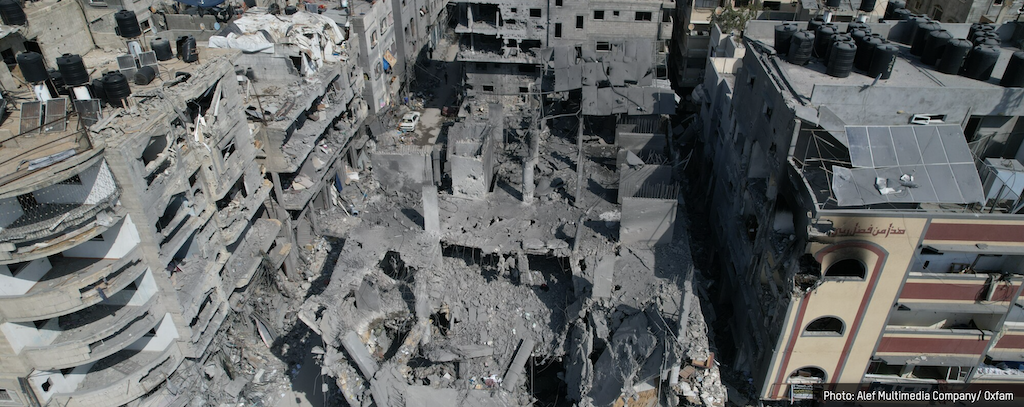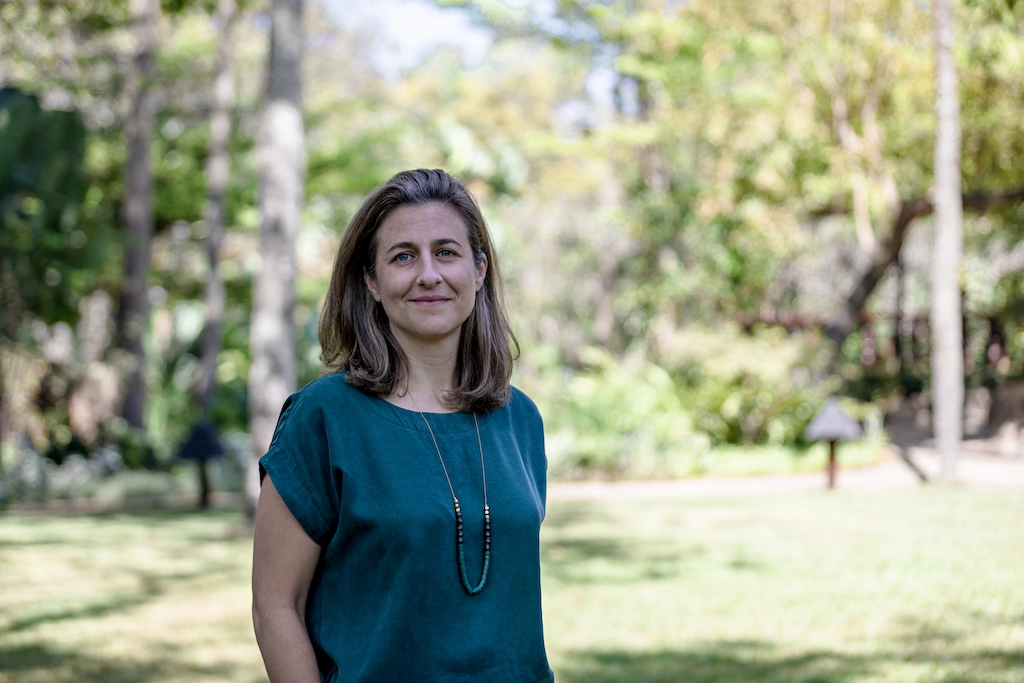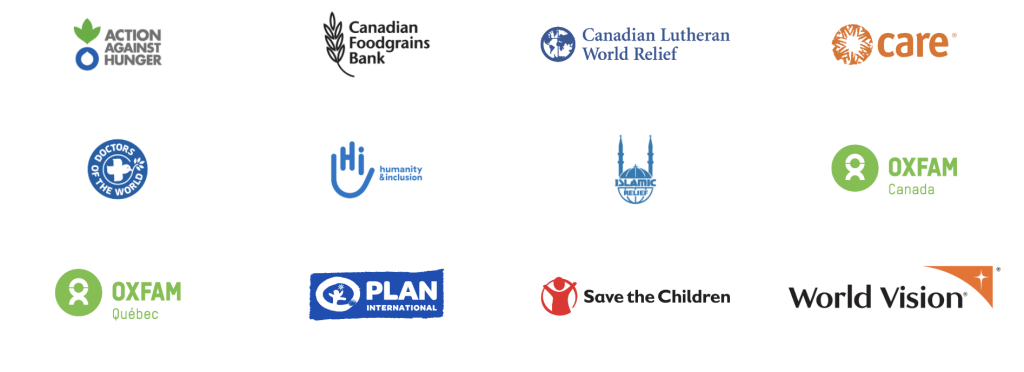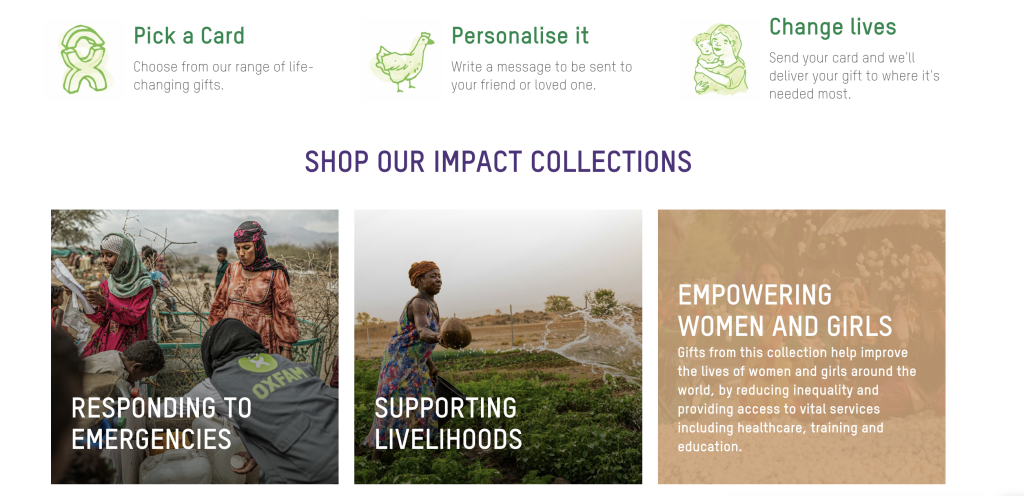In a world increasingly divided by conflict and crisis, it’s crucial to shine a light on the humanitarian efforts that strive to bring hope and aid to those in dire need. In a recent interview, I had the privilege of speaking with Lauren Ravon from Oxfam Canada, a key player in the Humanitarian Coalition. As the Gaza humanitarian emergency intensifies, demanding urgent international support, Lauren offers an insightful perspective on the ground realities and the critical work being done to alleviate suffering. This post is not just about understanding the crisis but also about recognizing our role in contributing to a solution.

Candace (00:09.98): In today’s first interview, we’re delving into a situation that’s unfolding far from our doorsteps, yet hits close to the heart of anyone who values human dignity and the sanctity of life. The Gaza humanitarian emergency has escalated to a point where urgent international support is needed, and leading the charge among those offering a lifeline is the Humanitarian Coalition.
Joining me today is Lauren Ravon from Oxfam Canada, a key figure in this coalition of hope, who brings with her a wealth of experience and a deep commitment to humanitarian aid. As the situation in Gaza continues to deteriorate, Lauren and her team are working tirelessly to provide essential services and support to those caught in the crossfire of conflict. In a time where the world feels more divided than ever, their work is a testament to what we can achieve when we come together. Lauren, welcome to What She Said.

Lauren Ravon, Oxfam Canada (01:04.93): Candace, thanks so much for having me on today.
Candace (01:07.329): So your work is more important than ever, and I’m really eager to hear how the Humanitarian Coalition and Oxfam Canada are making a difference in Gaza and how our listeners can be a part of this critical mission. Can you start by telling us more about the Humanitarian Coalition and about Oxfam Canada? Sort of a two-parter here.
Lauren Ravon, Oxfam Canada (01:27.874): Well, first, I just want to say thank you for covering the humanitarian angle of this conflict. A lot of the commentary on the conflict is very loaded, very politicized, with people taking different positions in different camps. And at the end of the day, what we have to remember is that these are people we’re talking about, people and civilians both in Israel and in Palestine who are suffering today. And we really want to make sure that the attention stays on that and the importance of providing relief to civilians and building a path towards peace. So, I’m very happy to be on today to discuss that.
Oxfam Canada is an international organization, part of the global Oxfam family, working in about 60 countries around the world. We do humanitarian work, long-term development work with communities and partners in countries around the world, and advocacy. And Oxfam Canada is one of the founding members of the Humanitarian Coalition that you referenced. The Humanitarian Coalition was formed to bring together some of the large organizations to fundraise jointly when an emergency hits. In times of crisis, like an earthquake, a tsunami, or a conflict breaking out, it’s much better if our organizations work together to draw attention to the problem with the Canadian public, to mobilize Canadians, to channel empathy in terms of donations to get humanitarian aid to the ground as fast as possible. And so in any large emergency, the Humanitarian Coalition members, our 12 member agencies, work together, and the situation that we’re facing today in Gaza is no different than it would be in the past. Despite the very charged nature of the conflict, we work as we always do. We come together in a way that follows our humanitarian principles, like impartiality, neutrality, focusing on civilians and populations first, and try to mobilize Canadians to be as generous as possible. Our experience with the whole Coalition is that precisely by working together, we’re a coalition that brings together faith-based organizations, larger and smaller organizations, with a presence across Canada, presence in communities. By working together, we’re able to get the word out, convey the complexities of any situation we’re facing in simpler terms, and also very often work with the Canadian government to get more support to amplify Canadians’ generosity.
This has been the case for several of our latest humanitarian appeals. The government of Canada has agreed to match funds that Canadians, so individuals like you and me, give to the Humanitarian Coalition to provide a humanitarian response to this crisis. And so that means that up until November 12th, any dollar that a Canadian gives to the Humanitarian Coalition to respond to the emergency in Gaza will be matched by the Canadian government.
Candace (04:28.241): And I know you mentioned there are 12 members. I don’t want you to mention them all, as that could take a long time, but maybe you could name a few of the members of the Coalition so people have an awareness of who is involved in this.

Lauren Ravon, Oxfam Canada (04:40.03): Of course. The Coalition is diverse, comprising different actors in the humanitarian space, each with distinct approaches and mandates, yet united in our humanitarian commitment. Organizations like Oxfam, one of the founding members, and Islamic Relief, a faith-based organization, are part of it. We also have Save the Children and The Canadian Food Grains Bank, known for their expertise in food security and provision in emergency contexts.
Oxfam is globally recognized in the humanitarian space for our expertise in water and sanitation. In any humanitarian response, Oxfam provides access to clean water, sanitation kits, and hygiene kits for communities, rehabilitates water purification systems, and provides safe latrines in refugee camps or displacement camps. Other Coalition members might focus more on food delivery, medical assistance, or support for disabled people affected by conflict or disaster. By working and fundraising together, we ensure that all bases of a humanitarian response are covered.
Candace (06:14.493): You mentioned earlier that this is a really politically charged atmosphere. Given the complex political landscape surrounding the Gaza humanitarian crisis, how does the Coalition navigate these challenges to ensure aid reaches those in need without getting entangled in the conflict’s politics? It seems like a constant struggle against that pull.
Lauren Ravon, Oxfam Canada (06:43.182): It is challenging, and it’s not the first time we’ve faced such challenges as a Coalition. Most emergencies have some political dimension, and even natural disasters are often linked to climate change, which has political drivers. Thinking any humanitarian emergency could be devoid of politics is probably naive. In this situation, it’s much more pronounced.
Humanitarian organizations like ours adhere to four guiding principles that unite all members of the Coalition: humanity, neutrality, impartiality, and independence. This means we provide aid to those in need regardless of identity, race, or religion, and stay neutral, not aligning with any side. We focus on international humanitarian law. These principles collectively guide our response.
However, abiding by these principles doesn’t mean we ignore the power dynamics at play in a conflict or crisis, as understanding these dynamics is crucial to performing our humanitarian job effectively. In the case of Gaza, the conflict’s nature currently prevents us from responding. Oxfam has been in Gaza for about 50 years, and typically, we would be actively providing water, sanitation, and protection services for civilians. But now, our staff are running for their lives, with about 90% displaced from their homes, many of which have been destroyed. This situation is similar for other members of the Humanitarian Coalition. We cannot provide humanitarian assistance under these circumstances.
That’s why Oxfam and many Coalition members are actively calling for a ceasefire. The situation in Gaza is dire and catastrophic. Without a ceasefire, we cannot respond. The healthcare system has effectively collapsed, the water system is near collapse, and waste management systems and water treatment facilities have also collapsed. We cannot address these issues if our staff are being bombed.
Lauren Ravon, Oxfam Canada (09:43.688): Our call for a ceasefire is not about taking a side in the conflict. It’s about the necessity to do our work. If we cannot perform our humanitarian duties, people’s lives are at risk. This is why we emphasize the importance of a ceasefire for the well-being of those affected.
Candace (11:33.061): Can we talk about the realities on the ground there? What does it look like for people in Gaza right now?
Lauren Ravon, Oxfam Canada (12:05.902): I want to acknowledge the conflict’s beginnings and recognize the close to 1,500 lives lost in Israel and the Israeli hostages still being held in Gaza. This crisis has impacted both Gaza and Israel. We’re focusing on the humanitarian situation in Gaza in particular because Israel, as a country, has social safety nets, hospitals, and infrastructure to respond to its people’s needs. The needs in Gaza, however, are skyrocketing.
There have been about 10,000 people killed in Gaza up to now, with the majority being women and children. About half of these are children who have been killed under bombings and shelling. There are likely over 12,000 injured, many still under the rubble. Perhaps most starkly, about 1.4 million people in Gaza have now been displaced, either due to the bombing or evacuation calls. We’ve heard of families living together in large groups, up to 40 or 50 people, because that’s the only shelter they can find. The medical system has collapsed, meaning basic medical services are no longer available, and hospitals are also at risk of being bombed. Gaza, being a territory that relies on outside aid for fuel, food, and medical supplies, is now cut off, leading to acute hunger and escalating waterborne diseases.
Candace (14:13.261): It’s so frustrating that you can’t get in to help these people. What can we do to help, considering the government’s matching program?
Lauren Ravon, Oxfam Canada (14:41.655): Oxfam still has some capacity on the ground, but it’s much less than if it were safe to operate fully. We’ve been distributing cash to vulnerable families, food, and hygiene kits. These operations are limited compared to what could be achieved without the current dangers. When Canadians donate to the Humanitarian Coalition, they can give either to the Coalition centrally or to any member agency. The Government of Canada will match these donations up to $10 million. This matching program is a response to the Coalition’s expertise and incentivizes greater generosity. Donating now means that as soon as we can operate fully, we’ll have the means to provide immediate aid. Rebuilding in Gaza will take months, if not years, but every dollar donated serves a purpose, helping to rebuild water systems, sanitation, hospitals, livelihoods, and food infrastructure.
Candace (17:14.377): Beyond financial contributions, which might be difficult for some given the global economic situation, what else can people do?
Lauren Ravon, Oxfam Canada (17:25.994): Spreading the word is also crucial. Despite the extensive media coverage, the humanitarian dimension often gets lost in political commentary. Sharing information about the Humanitarian Coalition, the call for donations, and the human stories behind this tragedy is vital. We have first-hand testimonies from our colleagues in Gaza on social media, telling their families’ stories and the realities they face. These personal narratives are important to understand the human impact of this crisis.
Candace (18:42.017): Could you share some of the social channels or the website where people can find out more?

Lauren Ravon, Oxfam Canada (18:51.746): You can visit the Humanitarian Coalition at humanitariancoalition.ca. Any donation made there will be matched until November 12th. You can also visit the Oxfam Canada website at oxfam.ca. Donations made directly to Oxfam are part of the Coalition’s initiative and will also be matched. I particularly encourage following Oxfam Canada’s Instagram feed for first-hand accounts from Gaza.
Candace (19:36.797): Lauren, thank you so much for joining me and for the important work you’re doing. It’s been a pleasure talking to you, albeit under terrible circumstances. Let’s have you back again someday to share some successes in the area.
Lauren Ravon, Oxfam Canada (19:52.606): I would love that and really appreciate the time today. Thank you.
As we conclude this heart-rending yet inspiring conversation with Lauren Ravon, it’s clear that the situation in Gaza is not just a remote news item but a human tragedy that calls for our immediate attention and action. The Humanitarian Coalition, led by organizations like Oxfam Canada, is doing monumental work under extremely challenging conditions. However, they need our support.
Financial contributions are crucial but beyond monetary aid, spreading awareness, sharing human stories, and amplifying the voices from the ground are equally important. Every action, no matter how small, contributes to a larger wave of change and support. Visit the Humanitarian Coalition or Oxfam Canada to make your contribution. Let’s not be bystanders in this crisis. Your support can and will make a difference.